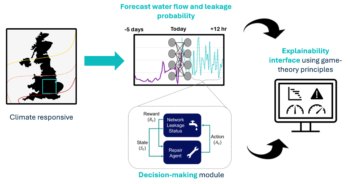News – Blog
Meet the Team: gAIn Water (08/11/2024)
November 8, 2024
Meet the team behind gAIn water, an AI-driven leak detection system used to reduce water loss, improve efficiency and minimise environmental impacts.
Water is one of the most wasted resources on the planet. In 2021, global water losses were estimated at 32 billion m³ per year due to physical breaks and leakages in water pipes, equating to a loss of US$9.6 billion annually. This issue is becoming increasingly pressing as water shortages are projected to affect nearly half the global population and will be further compounded by inadequate infrastructure, population growth, and climate change. Water leaks not only waste clean and treated water, they also degrade its quality, increase energy consumption, and raise household bills. In England and Wales, water bills have risen 8.5% in the last five years due to infrastructure investment, rising energy costs, and efforts to tackle the leakage problem.
In England and Wales, 20% of treated water is lost to leakage, putting immense pressure on the ageing infrastructure to provide an adequate supply to the UK. Traditional methods for managing water flow and detecting leaks, such as monitoring the average minimum night flow (the lowest flow that occurs in a zone when consumption is at its lowest, usually between 2 AM and 5 AM), are becoming increasingly inadequate and only provide a reactive approach to identifying the leaks. This means leaks can only be identified three to five days after they occur, resulting in a significant amount of water lost before action is taken. Many leaks remain unnoticed unless they are large or clearly visible, meaning smaller leaks go undetected. These current methods focus on reacting to visible or reported bursts, leaving many leaks undetected and unsolved until they cause significant damage, resulting in inefficiencies across the water network.
As global water shortages worsen, adopting a proactive approach to leak management will be critical in ensuring a more sustainable and resilient water supply system.
“For the UK water companies, halving water leakage is beyond being a reputational or regulatory issue and is now a requirement. In order to meet the projected supply gap of 4,800 Ml/day by 2050, we will need to develop and deploy innovative solutions, utilising the very latest technologies. The gAIn water solution, combining artificial intelligence with real-time sensor data, will enable leak awareness and location times to be driven down, resulting in dramatically reduced leak run times.”
– Jeremy Heath, Innovation Manager, SES Water.
Predicting Water Leakage
gAIn Water hopes to provide a proactive solution for managing water leakage. The gAIn Water framework offers a groundbreaking approach to tackling the water wastage crisis. This framework includes water flow forecasting, detection of leaks, explainability and decision-making for resource allocation to repair leaks. A key component of gAIn Water is FLOWAID, which leverages advanced technology combined with real-time weather information to predict leaks and water usage up to 12 hours in advance. It then helps prioritise repairs by focusing on the most critical leaks while keeping disruptions to a minimum. This proactive approach enables water utilities to identify and address leaks before they turn into major problems, helping to reduce water loss, improve efficiency, and minimise environmental impacts.
At the core of the gAIn Water framework, we propose a smart AI model that learns from historical patterns in waterflow and weather data, to accurately predict when leaks are likely to occur and estimate water demand under various weather conditions. This dual capability will enable water companies to manage their resources better and respond more quickly to issues.
One of the standout features of the gAIn Water framework is FLOWAID’s focus on unusual water flow patterns. By prioritising these rare occurrences, the system can catch potential problems that traditional methods might miss. During tests, FLOWAID has shown to predict leaks with an impressive 96.7% accuracy, far surpassing the traditional methods, which only achieve about 58.2% accuracy. By employing explainable AI, gAIn water provides transparency into how decisions are made, which allows utilities to understand and act on the system’s recommendations.

Image owned by UKCRIC
Supporting long-term sustainability for the UK water supply
The gAIn Water framework significantly enhances the resilience of the UK’s water supply systems by integrating advanced leak detection, forecasting, explainability and decision-making for resource allocation. This proactive approach not only supports operational efficiency for utilities but also leads to cost savings for consumers, helping to make water services more affordable. By conserving water and lowering the energy consumption associated with water treatment and pumping, the gAIn Water framework plays a crucial role in supporting long-term sustainability. It aims to assist the UK in meeting its national climate and environmental targets, ensuring that resources such as water and energy are used more responsibly.
The incorporation of real-time weather data allows the gAIn Water framework to adapt to changing environmental conditions, minimising disruptions in water supply during extreme weather events. By promoting efficient water management practices, it fosters equitable access to resources and builds public trust in essential services. As the UK modernises its infrastructure, solutions like gAIn Water look to support reliable access to water while safeguarding the environment for future generations.
“Being part of the Manchester Prize has allowed gAIn Water to not only enhance our AI capabilities but also gain crucial guidance on scaling and responsible innovation. Through engaging webinars and academy days, along with tailored feedback during check-in sessions, we have strengthened our value proposition and developed a clearer path to market. This comprehensive support has positioned us to make a significant impact on water management sustainability.”
– Simon Duddy, Business Development Director at UKCRIC Ltd.




